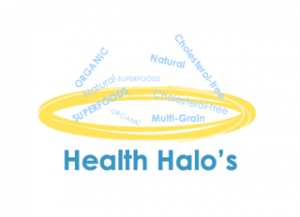Food and nutrition are topics almost everyone has an opinion on. Marketers like to develop or use buzzwords to gain market appeal. These buzzwords are known to entice health conscious consumers, but are they all they’re cracked up to be or are these ‘health halos’ blinding us to the actual benefits of our food? Here are a few common buzzwords:
Multi-grain. What it means. Multiple grains were used to develop the product. Does it matter? Although having multiple grains in a product may increase the nutrient variety, the concern is determining the AMOUNT of grains used in the product. Some multigrain products may only have a small percentage of grains. Read ingredients lists to determine the actual nutrient quality.
Gluten-free. What it means: Product contains no detectable gluten (less than 20 parts per million) Does it matter? Depends. It is vital for individuals who have coeliac disease where gluten can actually damage their intestines, but gluten itself is not a determinant of the nutritional quality of a food. Many gluten containing foods can be healthy, just as many gluten-free options can be unhealthy.
Superfood. What it means: Foods that claim to have additional health benefits or exceptionally high nutrient value. Does it matter? No. There is no governing body protecting the term or its use. This means that most fresh produce items could be considered ‘superfoods’. If it helps people consume healthier options, then great, go for it, but including a variety of nutrient-dense foods in the diet is going to be better for you than sticking to one ‘superfood’.
Natural. What it means: Generally referring to the use of ingredients that are not artificially produced and naturally occurring. Does it matter? Many foods may contain all natural products, but still not be the healthiest option. Fats, sugars and salts can all be natural. Look at the ingredients list and the nutrition information panel before deciding if a product is the best option. Be buyer aware.
Cholesterol free. What it means: Product does not contain cholesterol. Does it matter? Products which are often labelled ‘cholesterol-free’ are naturally cholesterol free. For example Avocados, one brand may have a cholesterol free logo, whereas another without the label is still naturally cholesterol free. Be aware of over-marketing.









